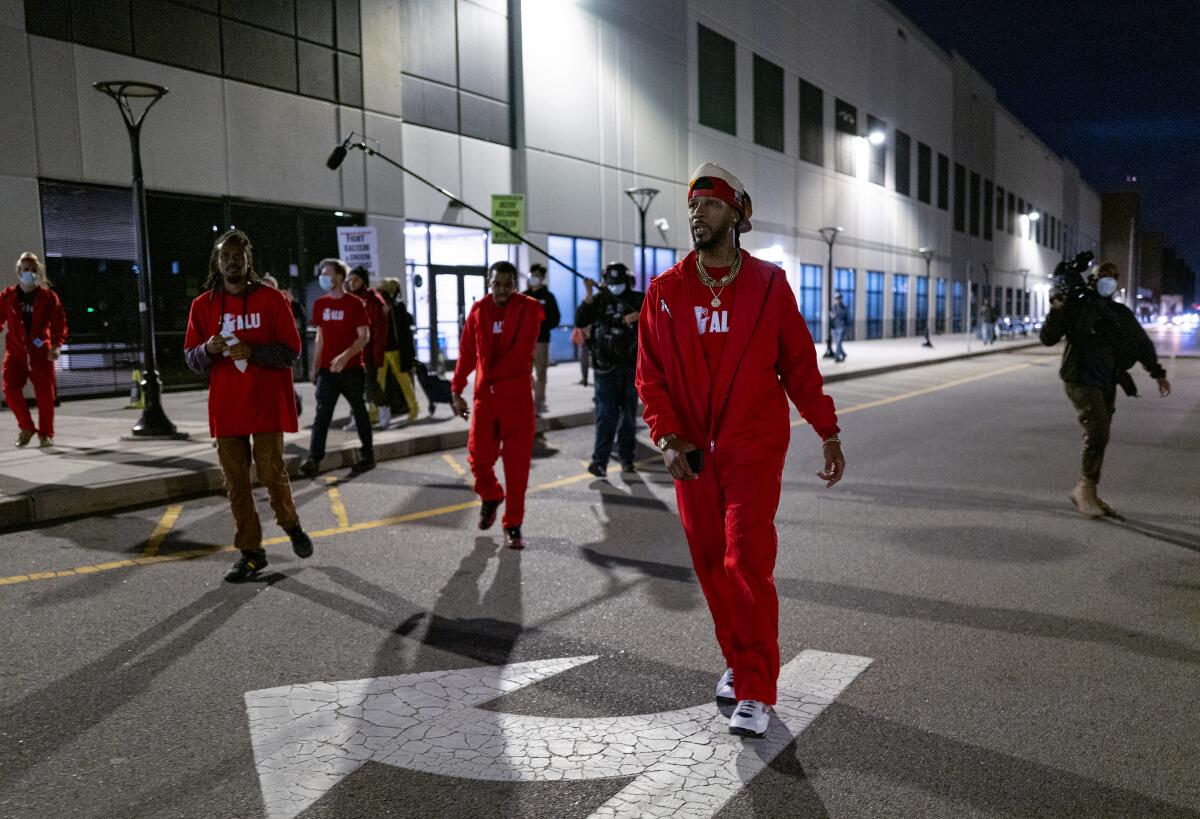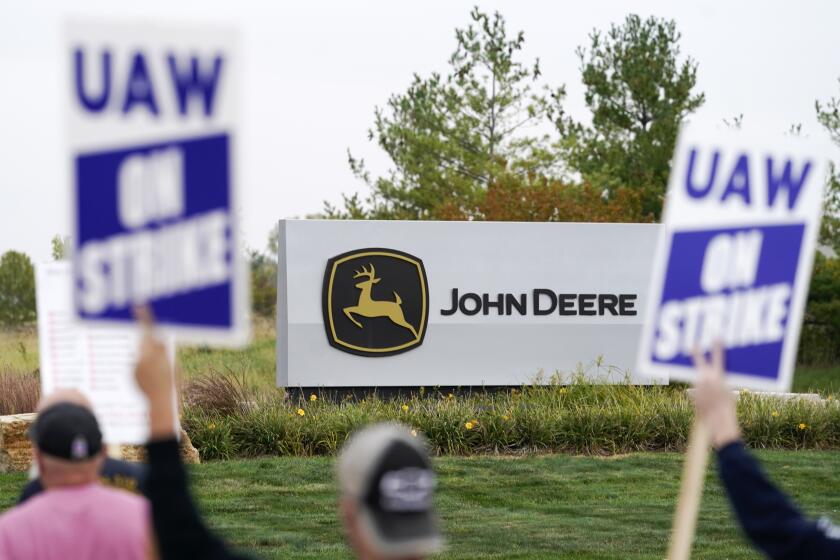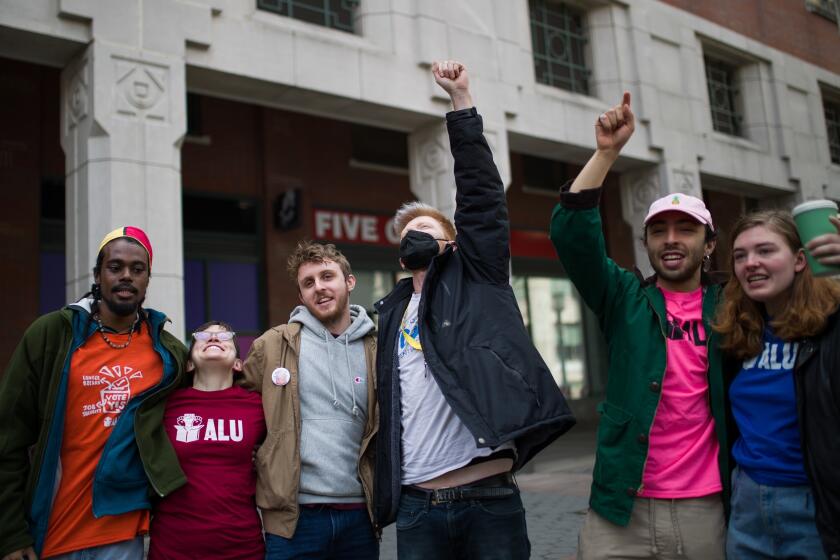Amazon workers scored a huge union victory but face a tough road ahead

- Share via
The union victory at Amazon’s JFK8 facility in Staten Island was truly remarkable. A majority of the employees there voted last week for union representation despite the company’s hard-nosed union avoidance tactics, marking the first successful U.S. organizing effort in the company’s history.
American labor law has embodied free speech rights for employers, meaning they may say virtually anything to employees that is not an obvious threat of reprisal or a promise of benefit. As a result, employers frequently spout sophisticated messaging that boils down to the specious proposition that employees somehow don’t need unions.
As a worker, even if you don’t want to hear this message, you can be forced to listen to it during “captive audience meetings” — compulsory all-employee meetings where the employer makes its pitch.
An economic justice agenda and standing firm against two-tier pay systems are helping unions gain public respect.
It takes a steely group of workers to persist through what is, in effect, the psy-ops of an employer’s anti-union campaign: denigrating unions and unionism; implying threats; suggesting that organizing is futile because when bargaining a contract, an employer will “bargain hard.”
While an employer most obviously violates labor law by threatening and firing employees for attempting to organize a union, theoretically lawful behavior can be coercive. For example, Amazon held mandatory worker meetings to resist unionization before the elections in Staten Island, N.Y., and Bessemer, Ala. Though such meetings are technically legal, they are coercive.
The JFK8 election victory is an enormous accomplishment, but the workers’ struggle is by no means over. Labor supporters must understand that the anti-union playbook Amazon is likely to follow from here is well established.
The legal delay likely to come next will give this generation’s labor movement observers a bird’s-eye view of one reason why unions represent only 6% of the private sector workforce.
Even after a successful union election, Amazon can lawfully delay meaningful bargaining with its union for months or even years. Although the election result cannot be directly appealed, Amazon may indirectly appeal: When the union requests that Amazon bargain, the company may simply refuse.
This technical refusal of the legal duty to bargain would violate the law. But even if the relevant regulating agency — the National Labor Relations Board — agreed that such a violation had occurred, it would have no ability to force Amazon to negotiate. That power lies with the federal courts.
In pursuing the unlawful “refusal to bargain,” Amazon may claim that the election was legally tainted, achieving a backdoor appeal. This customary maneuver takes time because it has to go to federal circuit court, and employees typically have no idea what is happening while the NLRB and the federal circuit courts launch into a months-long back-and-forth.
Amazon workers in Staten Island, N.Y., have voted to unionize, marking the first successful U.S. organizing effort in the retail giant’s history.
Then, assume that a court eventually ordered Amazon to bargain and did not “set aside” the election, forcing it to be held again. The company would still have no legal duty to agree to a single union proposal. Under current federal law, all Amazon must do is meet with the union at reasonable times of day and bargain in “good faith” over working conditions. A failure to agree to proposals does not legally equal “bad faith.”
Historically, the law has had an almost mystical confidence that, if the union and an employer bargain, they will somehow achieve an agreement. That faith may be sorely tested in this case.
If the bargaining drags on for longer than a year, employees might become discouraged. If the union loses the support of a majority of employees, Amazon might lawfully withdraw recognition (though it would have to prove the loss of support). After a year without a contract, discouraged employees could lawfully file a new petition to oust the union. Amazon is probably counting on that.
The union does have its own crucial tools and tactics. It could lawfully exert pressure to thwart delay. One such option would be calling a strike. But striking employees are subject to “permanent replacement”: Amazon could hire substitute employees, and strikers would not be entitled to job reinstatement unless the substitutes decided to leave. For many workers, being “replaced” is indistinguishable from being fired, though employees who strike in reaction to labor law violations are entitled to prompt reinstatement.
Short of striking, employees might lawfully picket and organize community-based protests to leverage public relations pressure to support improvements to Amazon’s working conditions. The union may not, however, involve other employers in its dispute with Amazon, a line that practically can be difficult to discern. If, for example, the union tried pressuring Amazon’s suppliers to support its attempt to gain a contract with Amazon, it would risk violating the law.
Incredibly, Amazon could also legally relocate its unionized JFK8 facility and likely face no obligation to bargain with the union over the relocation, though it might be required to bargain over the effects on employees. It could likely also close JFK8, unless regulators found that it was trying to chill unionism in the rest of its business — which is hard to prove. Given Amazon’s investment in the facility and its strategic location in the Northeast, however, it seems unlikely the company would move or shutter it.
The upcoming struggle for a union contract at Amazon presents the perfect opportunity for society at large to revisit several archaic labor law principles. Few employee-hostile rules are ensconced in constitutional law. Congress can rewrite labor law to allow fewer anti-union loopholes for employers, and the NLRB can reinterpret existing labor law to scrutinize these loopholes. It is high time to do so, and Amazon is the ideal symbolic vehicle for beginning such a project. Labor protections have never been created without pressure and a fight.
Michael C. Duff is a professor of law at the University of Wyoming College of Law and a member scholar at the Center for Progressive Reform.
More to Read
A cure for the common opinion
Get thought-provoking perspectives with our weekly newsletter.
You may occasionally receive promotional content from the Los Angeles Times.











